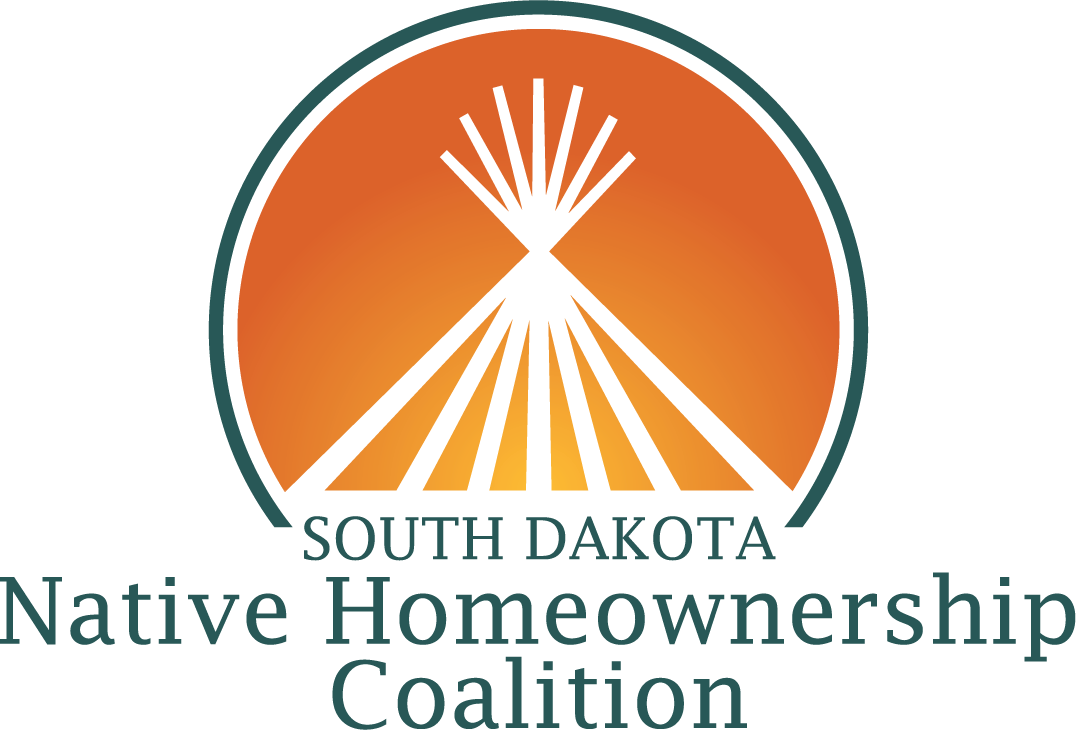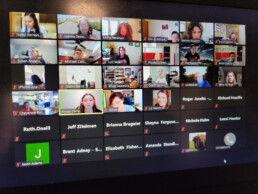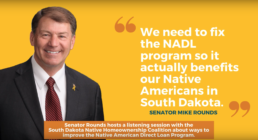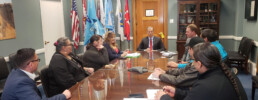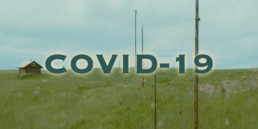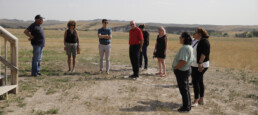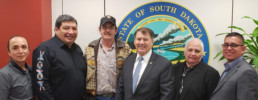Coalition Receives $1.7 Million Grant, Kicks Off New Statewide Down Payment Assistance Program
During the South Dakota Native Homeownership Coalition’s first-ever Annual Membership Meeting, the Wells Fargo Foundation announced a $1.7 million grant award from its Invest Native initiative to support the Coalition’s continued growth and development, including creating a new housing development subsidiary to support tribal communities in their efforts to increase the number of safe and affordable homes.
“As the Bank of Doing, our goal is to work alongside Native communities and continue a dialogue around how we can best support local leaders and their work,” stated Otis Rolley, president of the Wells Fargo Foundation. “The collaborative approach of the South Dakota Native Homeownership Coalition is highly effective in creating more access to resources and empowering more Native homeowners.”
This grant is part of Invest Native, a $20 million philanthropic initiative by Wells Fargo to strengthen housing access and affordability, small business growth and sustainability in Native communities across six states.
“We are grateful to Wells Fargo for investing in statewide coalitions like ours that bring together partners who develop innovative strategies to help Native families overcome the barriers associated with homeownership in Indian Country,” said Cheryce Not Afraid, Director of the Coalition.
At today’s meeting, the Coalition also announced its new down payment assistance program designed to increase home affordability for South Dakota’s Native American families and close the state’s racial homeownership gap, which currently lies at 35.7%. The program, which was supported by previously awarded funding from Wells Fargo and the Northwest Area Foundation, will infuse $500,000 of down payment funds into South Dakota’s Native communities, resulting in at least 50 new Native homeowners.
Also of significance during the Coalition’s Annual Membership Meeting, U.S. Senator Mike Rounds (R-SD) provided an update on several pieces of federal legislation he is advancing to support increased rates of Native American homeownership, including efforts to reform the U.S. Department of Veterans Affairs Native American Direct Loan, to expand the U.S. Department of Agriculture 502 home loan relending demonstration, and to streamline the Bureau of Indian Affairs mortgage approval process.
“The Coalition has achieved some critical milestones today,” said Sharon Vogel, Coalition Chairwoman and Executive Director of the Cheyenne River Housing Authority. “Throughout our ten-year history, we’ve strived to make it easier to achieve homeownership. Since 2016, Coalition members have supported 253 Native families to become homeowners. As we expand our programming and continue to remove federal policy impediments, that number will only get higher.”
Coalition Member Recognized on National Stage
Stephanie Provost received the Industry Achiever Award from Oweesta Corporation.
On Wednesday, June 28th, during their 2023 Native CDFI Capital Access Convening’s Native Awards Night, Oweesta Corporation recognized two individuals at the Native CDFI staff level for their outstanding commitment to service in Native CDFI industry. One of the awardees was Stephanie Provost of Mazaska Owecaso Otipi Financial, a long-time Coalition member.
Oweesta awarded the Industry Achiever Award to Stephanie because she exemplifies excellence in the Native CDFI industry, excells at her position within Mazaska, and helps the organization meet their mission. As Loan Officer of Mazaska, Stephane plays a crucial role in creating affordable housing opportunities. Her dedication and passion have allowed Mazaska to provide over $4.8M in housing loans to 43 borrowers in just six years.
The Coalition would like to congratulate Stephanie, not only for her commitment to Mazaska, but also for all the contributions she makes within the Native homeownership field. She has helped innovate lending models to make the Native American Direct Loan (NADL) more accessible and has been an integral part of the USDA 502 Relending Demonstration Program. Stephanie recently went to the Hill to advocate for policies that promote Native homeownership, and recently became a homeowner herself. This award acknowledges Stephanie’s passion and hard work for the industry and people she has helped to make homeownership a reality.
Coalition Celebrates Upward Trend in Native American Homeownership During National Homeownership Month
In recognition of June as National Homeownership Month, the South Dakota Native Homeownership Coalition hosted a virtual celebration where nearly 40 stakeholders from national, state, and tribal levels gathered to share their successes in creating homeownership opportunities for Native American families. The Coalition is also supporting several member organizations as they host local homeownership celebrations throughout the state by providing small housewarming gifts for approximately 100 Native American homeowners.
During the virtual celebration, the Coalition announced they have hired Elias Mendoza (Sisseton-Wahpeton Sioux Tribe) as the Program Director. This is a major step in the Coalition’s journey to become an independent nonprofit organization. As the Coalition’s first full-time staff person, Mendoza will guide the organizational development process and interface with the Coalition’s working committees.
“I am thrilled to be a part of the South Dakota Native Homeownership Coalition and look forward to working with other passionate people across the state to create a clear path to homeownership for our Native families,” says Mendoza.
Also during the event, the Coalition revealed new data showing tremendous growth in Native American homeownership in 2020, despite the COVID-19 pandemic. From 2019 to 2020, Coalition member organizations reported a 126% increase in home loan volume as well as an 80% increase in the number of new homeowners. Nearly all loans closed (94%) were on Indian reservations. There was also an upward trend in funding support for Native organizations from the South Dakota Housing Development Authority’s Homeownership Education Resource Organization (HERO) program. A copy of the full data report can be viewed here.
“The growth in Native American homeownership demonstrates just how hard our partners and practitioners are working in Native communities. We have accomplishments on so many levels to celebrate,” says Tawney Brunsch, Executive Director of Lakota Funds, which serves as the fiscal agent for the Coalition.
Several recent developments are creating a favorable outlook on the policy horizon for Native American homeownership, which will support further growth in this sector. The U.S. Senate Committee on Banking, Housing and Urban Affairs Subcommittee on Housing held their first hearing of the year on “Housing for Native Americans: Review of Federal Programs, Barriers, and Opportunities” where Eric Shepherd, Executive Director of Sisseton Wahpeton Housing Authority, and also Coalition member, testified. This was the first time the Senate Housing Subcommittee held a hearing on Indian housing issues in over a decade! In addition, the hearing illuminated the strong, bi-partisanship collaboration between Chairman Tina Smith (D-MN) and Ranking Minority Member Mike Rounds (R-SD). Furthermore, the Coalition is participating in the South Dakota Legislature’s 2021 Interim Study on Workforce Housing Needs to examine challenges and opportunities in housing for low- and moderate-income individuals and families throughout the state.
“It is great to see Native American representation in these policy discussions. We’re moving in the right direction to create an inclusive economy,” says Mendoza.
Senator Mike Rounds (R-SD) Hosts Listening Session on VA Native American Direct Home Loan Reform
Senator Mike Rounds (R-SD) and the South Dakota Native Homeownership Coalition held a listening session recently as part of the Senator’s efforts to reform the U.S. Department of Veterans Affairs (VA) Native American Direct Loan (NADL) program. In addition to participation from Senator Rounds, his staff, and Coalition members, the listening session featured testimonies about the NADL home loan process from several Native American veterans.
During the session, Senator Rounds told participants, “We need to fix the NADL program so it actually benefits our Native Americans in South Dakota.”
“Native veterans shouldn’t have to go to battle to get an NADL mortgage,” said Geri Opsal, Co-Chair of the Coalition’s Veteran’s Homeownership Committee and Tribal Veterans Service Officer for the Sisseton Wahpeton Oyate. “They should have the same access to their VA benefit as any other veteran applying for a VA guarantee loan off the reservation.”
“We really appreciate Senators Rounds’ leadership on this issue,” said Tawney Brunsch, Executive Director of Lakota Funds. “During our discussions, you could tell he really understood how important it is for Native veterans to have ‘boots on the ground’ to help them through the mortgage lending process.”
With an average of only 20 NADL applications being approved nationwide each year, Senator Rounds has engaged the Senate Veterans’ Affairs Committee to explore solutions that would provide Native American veterans with meaningful access to the benefits they have earned. Those efforts included a request to the Government Accountability Office to conduct a thorough review of the NADL program, which will be a crucial step toward systemic change.
Video by Senator Thune Describes Great Success of 502 Relending Pilot
During the 2020 OFN Virtual Conference, Senator John Thune (SD-R) shared with conference attendees how the 502 Relending Pilot is creating homeownership opportunities in Indian Country.
Thank you Senator John Thune for championing the USDA 502 relending demonstration program with the Native CDFIs in South Dakota and for supporting the work of CDFIs nationwide. Watch the video below for a personal message from Senator Thune to Opportunity Finance Network virtual conference attendees!
Coalition Members Partner to Deploy COVID-19 Housing Relief Funds
Three Native American nonprofit organizations – Four Bands Community Fund, Lakota Funds, and Mazaska Owecaso Otipi Financial – have been designated as partners in the SD CARES Housing Assistance Program (SDCHAP) to provide up to $1,500 in rental, mortgage, or utility assistance to families that have been financially impacted by the COVID-19 pandemic. The South Dakota Housing Development Authority (SDHDA) was awarded $10 million by the State of South Dakota to launch and administer SDCHAP.
“Knowing that low-income and minority communities have been hardest hit by the pandemic, we are grateful that the South Dakota Housing Development Authority has actively engaged Native American organizations to ensure funds are directed where they are needed most,” says Tawney Brunsch, Executive Director of Lakota Funds.
SDHDA opened the online SDCHAP application on October 22, 2020 and will be accepting applications until December 18, 2020, or sooner if funds are expended. To provide assistance with families that don’t have reliable internet access and to help process applications, SDHDA has partnered with a total of 11 organizations, just under a third of which are located on Indian reservations.
“Since COVID hit, we have seen financial burdens manifest in different ways. We can really help a lot of people with this program and are glad to be a part of it,” says Colleen Steele, Executive Director of Mazaska.
The SDCHAP application can be found at sdcareshousingassistance.com. Four Bands is assisting applicants in Dewey, Ziebach, Wallworth, Corson, Hughes, Stanley, Buffalo, and Brule Counties. Lakota Funds is supporting applicants in Oglala Lakota, Jackson and Bennett Counties. Mazaska is covering Oglala Lakota, Jackson, Bennett, Fall River, Pennington, Meade, Lawrence, Todd, and Custer Counties.
All three Native organizations and SDHDA are members of the South Dakota Native Homeownership Coalition and have been working collaboratively in various capacities over the past several years to increase homeownership opportunities for Native Americans throughout the state.
“All of the program partners are dedicated to making their communities a better place, and this is an opportunity to preserve progress on so many different levels. There is power in partnerships,” says Lakota Vogel, Executive Director of Four Bands.
Coalition Members Showcase Successful Native Veterans Homeownership Models
South Dakota Native Homeownership Coalition members are continuing to advocate for policies that increase rates of Native American veteran homeownership. Lakota Funds and Mazaska Owecaso Otipi Financial, both Native community development financial institutions (CDFIs) that serve the Pine Ridge Indian Reservation, hosted a Reservation-wide tour for two staffers from U.S. Senator Mike Rounds’ (R-SD) office, Michael Bekaert, Director of In-State Military and Veterans Affairs, and George Cannizzaro, Veterans Affairs Fellow.
“We are so thankful to George and Mike for taking the time to visit with us and really get a true understanding for the environment we are working in, the challenges our Native veterans are facing when it comes to purchasing a home, and the success we’ve had with implementing new and innovative models to support our veterans in becoming homeowners,” says Tawney Brunsch, Executive Director of Lakota Funds and also a member of the Coalition’s Native Veterans Homeownership Committee.
The tour included meet and greets with Native veterans at their homes and highlighted various loan products they had utilized – including the Mazaska construction loan, the USDA 502, and the Veterans Affairs’ Native American Direct Loan (NADL) – challenges they encountered, and strategies implemented by service providers to support Native veterans as they pursue homeownership. One such strategy highlighted during the day’s luncheon was a newly developed guide to homeownership for Oglala Sioux veterans, created by Mazaska with funding from Enterprise Community Partners. The printed guide helps Native veterans on Pine Ridge navigate the homeownership process and includes several resources.
“Many of the veterans we work with are almost ready to give up because they’ve run into so many road blocks trying to buy a home. Some have been at it for years. What we have found is that relationships matter – not just with our local veterans but also with other lenders, the Tribe, Bureau of Indian Affairs, Indian Health Service, and our many community partners. We serve as a liaison between the veteran and these agencies and resources to keep the process moving,” says Steph Provost, Loan Officer at Mazaska.
The tour follows several months of collaboration between the Coalition and Rounds’ office in an effort to streamline the NADL program. Most recently, in June, Rounds, a member of the Senate Veterans’ Affairs Committee (SVAC), along with SVAC Chairman Jerry Moran (R-KS) and Ranking Member Jon Tester (D-MT), called on the Government Accountability Office to review the NADL program. The senators requested the evaluation of the NADL program out of concern that it is not effectively serving Native American veterans. This request is a critical step towards programmatic improvement through legislative or other means.
Senator Rounds will also host a listening session this Thursday, September 3, 2020, for him to personally discuss reform strategies with Native veteran homebuyers and the Coalition members that support them.
“Homeownership on tribal lands can be a complex process, but we are continuing to chip away at the barriers to ensure that our veterans are compensated for the sacrifices they have made. It is exciting to see progress and the level of congressional support we have,” says Brunsch.
South Dakota Congressional Delegation Urges USDA to Continue Home Loan Program on Tribal Land
Three members of the United States Congress – Senator John Thune (R-SD), Senator Michael Rounds (R-SD), and Representative Dusty Johnson (D-SD) – urged U.S. Department of Agriculture (USDA) Secretary Sonny Perdue to allocate additional funding to continue the 502 Relending Home Loan Program on tribal land in South Dakota.
Through this program, USDA Rural Development collaborated with two Native community development financial institutions (CDFIs) to increase access to Section 502 Direct Home Loans in Indian Country. The program was highly successful, deploying nearly $2 million in mortgage loans on two South Dakota Indian reservations in less than a year – about three times the amount deployed in the previous decade. The two Native CDFIs participating in the program – Four Bands Community Fund on the Cheyenne River Reservation and Mazaska Owecaso Otipi Financial on the Pine Ridge Reservation – estimate a growing pipeline of more than $3 million for Section 502 Direct Home Loans.
“As demand for homeownership strengthens amid the COVID-19 pandemic, the continuation of the pilot program would help more tribal families escape overcrowded housing situations and achieve their goals of homeownership,” said Sharon Vogel, executive director of the Cheyenne River Housing Authority and co-chair of the South Dakota Native Homeownership Coalition’s policy committee.
“We really appreciate Senator Thune’s leadership and the ongoing support from our South Dakota congressional delegation,” added J.C. Crawford, Chief Executive Manager of CBJ Producers, LLC and co-chair of the Coalition’s policy committee. “They understand that through this partnership with USDA, Native CDFIs are in the best place to get affordable 502 mortgage capital into tribal communities. Lakota Vogel at Four Bands, Colleen Steele at Mazaska and their lending teams are doing great work on the frontlines assisting their clients to navigate the homeownership process on trust land.”
A copy of the letter from the South Dakota congressional delegation can be viewed here:
Senator Rounds Updates Coalition about Progress Toward Increasing Access to Mortgages for Native American Veterans
Today, Senator Mike Rounds (R-SD) provided an update letter to the South Dakota Native Homeownership Coalition on his reformation efforts of the Department of Veterans Affairs’ Native American Direct Loan (NADL) program. Although the NADL program is intended to provide mortgage financing for Native American veterans living in reservation communities, levels of participation have historically been very low.
Earlier this month, Rounds, a member of the Senate Veterans’ Affairs Committee (SVAC), along with SVAC Chairman Jerry Moran (R-KS) and Ranking Member Jon Tester (D-MT), called on the Government Accountability Office (GAO) to review the NADL program. The Senators requested the evaluation of the NADL program out of concern that it is not effectively serving Native American veterans. This request is a critical step towards programmatic improvements through legislative or other means.
“It’s been a long-time coming but thanks to Senator Rounds’ leadership, we are finally starting to see some progress with reforming the VA’s Native American Direct Loan program,” says Robert Dunsmore, Tribal Veteran Service Officer for the Cheyenne River Sioux Tribe and also the Co-Chair of the South Dakota Native Homeownership Coalition’s Native Veterans Homeownership Committee.
Over the past several months, Rounds and his staff have met with VA officials and several tribal communities to gain a thorough understanding of the challenges within the NADL program. During this time, they have also worked collaboratively with the South Dakota Native Homeownership Coalition’s Native Veterans Homeownership Committee to explore potential solutions that would result in higher rates of homeownership for Native American veterans.
“We appreciate the time Senator Rounds and his staff have taken to come here to the Lake Traverse Reservation to see the homes we have built and hear about our concerns. Our veterans deserve to be homeowners, especially after serving our country in higher numbers than any other ethnic group in America,” says Geri Opsal, Tribal Veteran Service Officer for the Sisseton Wahpeton Oyate and also Co-Chair of the South Dakota Native Homeownership Coalition’s Native Veterans Homeownership Committee.
Click below to download and read the letter from Senator Rounds to the South Dakota Native Homeownership Coalition.
Groups Gather to Advocate for Affordable Housing
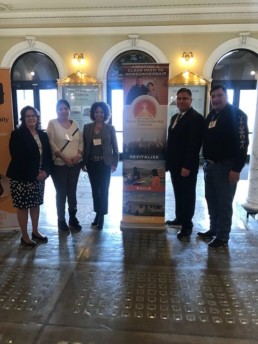
Homes for South Dakota, a coalition of approximately 30 nonprofit, public, and private entities, gathered in the rotunda at the State Capitol to raise awareness of the need for affordable housing across the state and to advocate for a dedicated source of revenue for the South Dakota Housing Opportunity Fund (HOF).
During a luncheon, participants called legislative attention to the HOF, a program that has awarded $16.2 million in grant funding to create affordable housing for over 2,000 families since 2013. Currently, funding for HOF comes from budget surpluses, but Homes for South Dakota members argue that a dedicated source of revenue is needed to strategically implement long-term planning and leverage investments for affordable housing projects.
“HOF dollars have been leveraged with other sources time and again to create affordable housing options for families in every county of the state,” says Tawney Brunsch, Executive Committee Member of the South Dakota Native Homeownership Coalition, an organization that exhibited at the Homes for South Dakota day at the Capitol.
With rental and real estate prices on the rise, nearly a quarter of all South Dakotans have become housing cost-burdened, meaning that more than 30% of their income is being spent on housing and utilities. These households have little money left for other basic necessities, such as food, medical care, and transportation.
“We have many low- to moderate-income families whose incomes can’t keep up with the increasing housing costs. HOF has been combined with federal funding and private financing to build affordable rental and homeownership units – and even provide down payment assistance in some cases. It is a proven successful solution,” says Brunsch.
Housing Opportunity Fund Case Studies
Developed for the Homes for South Dakota Day at the Capitol, this set of case studies highlights how South Dakota’s Housing Opportunity Fund is creating homeownership opportunities in tribal communities.
